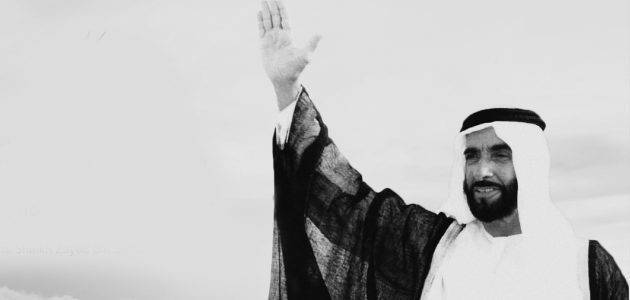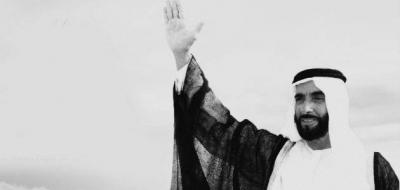On this day, 19 Ramadan 1425 AH, the late Sheikh Zayed bin Sultan Al Nahyan departed from this world, leaving behind a cultural legacy of humanitarian and charitable work. His legacy as a leader is enshrined in his humanitarian history, characterized by boundless generosity, a mission to spread goodness everywhere, and a goal to aid the afflicted and support the needy without discrimination based on gender, color, race, or religion.
Sheikh Mohammed bin Rashid Al Maktoum, Vice President of the UAE, Prime Minister, and Ruler of Dubai, described him in a previous meeting as a global leader for humanity, stating, "I have interacted with many world leaders over the decades, but I have never seen in my life the humanity, humility, and love for good and for people from all backgrounds as I have seen in Sheikh Zayed. The least that can be said about this exceptional leader is that he is a leader of humanity and its symbol."
In honoring his memory in a manner befitting his status in their hearts, the UAE's leadership, government, and people have committed to uphold his legacy of giving and continue the charitable works he instilled in their souls. Thus, the 19th of Ramadan each year has been declared "Zayed Humanitarian Day." This initiative commemorates the late Sheikh Zayed's role in establishing a legacy of humanitarian giving in the UAE, immortalizing the good deeds of this pioneer of humanitarian work.
This day has become an opportunity each year to remember the enduring legacy of the founding leader in charitable and humanitarian work. This year's commemoration coincides with the golden jubilee of the founding of the UAE in 1971, making it also a celebration of the golden jubilee of Sheikh Zayed bin Sultan Al Nahyan's giving.
His contributions cannot be measured merely by the years he led the UAE from the establishment of the union in 1971 until his passing in 2004; rather, his legacy continues timelessly even after his death. The memory of his pure spirit is present in every achievement accomplished by the UAE in charitable and humanitarian spheres, as he played a major role in transforming humanitarian work in the UAE into a lifestyle and a civilized behavior passed down through generations. This was achieved by institutionalizing humanitarian work and turning charitable activities into an integrated system adopted by both governmental and private sectors.
During his tenure, the UAE emerged as one of the most prominent countries contributing to humanitarian and relief efforts globally. Today, it stands at the forefront as the largest donor of foreign aid in the world.
### The Diplomacy of Giving
The founding leader elevated the value and presence of charitable work, transforming it into a significant aspect of the UAE’s foreign policy, extending aid and assistance to all people regardless of their religion or ethnicity. Evidence of Sheikh Zayed bin Sultan Al Nahyan's contributions can be seen in various countries around the world, where almost no part of the globe is devoid of a charitable effort that honors his noble memory.
By the end of 2000, the total aid provided by the UAE under his directives, through grants, loans, and assistance spanning most countries in the world, exceeded 98 billion dirhams.
For instance, in 1981, Sheikh Zayed presided over a summit announcing the creation of the Gulf Cooperation Council. Concurrently, he directed the "Abu Dhabi Fund for Arab Economic Development" to grant two loans to Bahrain amounting to 160 million dirhams for financing electrical and industrial projects. In 1972, he decided to assist Yemen by establishing the Sana'a Radio Station, and in 1974 he contributed an additional sum of $1.71 million to complete the radio and television project in Yemen. Under his direction, the UAE provided urgent assistance amounting to $3 million to alleviate the impact of floods that hit Yemen in the 1990s.
Egypt occupied a special place in the heart of the late Sheikh Zayed, who left a good legacy there through various forms including the construction of residential tourism cities, land reclamation, establishing numerous tourist villages, and providing financial support for medical centers and hospitals. After the October War in 1973, he took it upon himself to assist Egypt in the reconstruction of the Suez Canal cities "Suez - Ismailia - Port Said," which had been destroyed in the Israeli aggression during 1967.
He donated $20 million in 1990 during a historic global celebration in Aswan, Egypt, to revive the ancient Library of Alexandria.
In Morocco, dozens of prominent projects bearing the name "Zayed" stand tall, including Sheikh Zayed Foundation for Medical Assistance and a special center for childhood care. He directed the "Abu Dhabi Fund for Arab Economic Development" in 1976 to grant a loan of 40 million dirhams to the Ministry of Islamic Affairs and Endowment in Morocco.
In Palestine, the Sheikh Zayed Neighborhood Project in Jerusalem, costing around 15 million dirhams, is among the prominent projects he directed for implementation, along with other projects such as the reconstruction of Jenin Camp, costing about 100 million dirhams, and building Sheikh Zayed City in Gaza at a cost of approximately 220 million dirhams.
Sheikh Zayed's donations to Sudan included funding for the establishment of a medical college and Nasir Hospital in the Sudanese city of Wad Madani. He also assisted Lebanon by initiating mine clearance left by the Israeli occupation in the south at his own expense and ensured that the UAE played an active role in rebuilding Lebanon post-war, providing financial aid and grants for vital development projects.
Syria benefited significantly from Sheikh Zayed’s support for charitable and development projects, with the "Abu Dhabi Fund for Arab Economic Development" signing three agreements with Syria in Damascus to fund three industrial projects worth 911 million dirhams.
Internationally, in Pakistan, cities like Karachi, Lahore, and Peshawar proudly showcase the three Islamic centers established by Sheikh Zayed bin Sultan Al Nahyan to promote Islamic and Arab culture among the Pakistani populace.
The UAE's charitable projects under Sheikh Zayed exceeded the Arab and Islamic world, extending to all countries globally. For example, in 1992, the UAE donated $5 million to the American Disaster Relief Fund to assist victims of Hurricane Andrew in Florida.
Historical records acknowledge the honorable stances of Sheikh Zayed bin Sultan Al Nahyan in support of the people of Bosnia and Herzegovina amidst the most atrocious war crimes during the 1990s, directing $10 million on April 26, 1993, for their humanitarian relief.
In May 1990, an agreement to establish an Islamic printing press in Beijing was signed with funding from Sheikh Zayed to support the activities of Muslims in China, costing 3.1 million dirhams. He also donated $500,000 to support the UAE-China Friendship Association.
In 1999, under his directives, a relief plane left Abu Dhabi Airport en route to Greece to assist those affected by the earthquake that hit wide areas of the country. Following his instructions in 2000, the "Emirates Red Crescent" started distributing sacrifices in the Ingushetia Republic to Chechen refugees, as well as providing 145 tons of food aid to those affected by famine in the Horn of Africa.
The UAE Cabinet also decided to provide urgent assistance worth $100,000 to victims of the earthquake that struck Guatemala.
### Humanitarian Medals
In recognition of his charitable and humanitarian efforts, the late Sheikh Zayed bin Sultan Al Nahyan received medals and honors from various countries around the world to acknowledge his invaluable services to humanity.
In 1985, the International Organization for Foreigners in Geneva awarded him the "Golden Document" for being the most significant personality of the year for his prominent role in aiding residents within and outside his homeland in humanitarian, civil, and financial domains.
In 1988, the "Man of the Year" body in Paris recognized Sheikh Zayed bin Sultan Al Nahyan for his wise and effective leadership and his outstanding success in achieving prosperity for the people of the UAE and developing the land and its people, making the UAE an advanced and developed nation.
The Arab League awarded him the "Ribbon of Development and Growth" in 1993. The Moroccan Historians Society presented him with the "Gold Medal of Arab History" in 1995, acknowledging his efforts in serving Arabism and Islam and recognizing his generous support for scholars, along with his passion for history and historical studies.
In 1995, Sheikh Zayed was named the "Development Personality of the Year" globally based on a survey conducted by the Middle East Research and Media Studies Center in Jeddah, with participation from over half a million Arabs.
In 1996, the Arab Labor Organization presented him with the Labor Shield in recognition of his pioneering role in supporting joint Arab work.
The United Nations General Assembly, in a historic initiative on November 4, 2011, held a memorial service for the late Sheikh Zayed bin Sultan Al Nahyan, featuring speeches by the Assembly President and representatives from geographical regions around the world, including Asia, Africa, Eastern Europe, Latin America, and Western Europe, along with a representative from the United States as the host nation.
The speakers during this special session highlighted aspects of the political diplomacy, wisdom, and significant achievements of the late Sheikh Zayed bin Sultan Al Nahyan, both in building the UAE and its modern renaissance and in international cooperation, humanitarian work, and generous assistance to impoverished and developing nations.
They affirmed that his memory would remain an inexhaustible source of inspiration for his people and for all those who strive hard for peace, humanitarian betterment, and joy for humanity.
### In Zayed's Footsteps: Through Numbers
Following in the footsteps of Sheikh Zayed bin Sultan Al Nahyan, the UAE continues its humanitarian approach in providing developmental, humanitarian, and charitable assistance to various regions of the world. The numbers reflect the Emirati humanitarian role from 1971 to 2015.
The UAE has provided over 174 billion dirhams dispersed across 178 countries that benefited from UAE donor projects and programs, supported and cared for by the wise leadership and the generosity of the authentic Emirati people. Therefore, the UAE was ranked first worldwide in terms of the volume of official developmental assistance compared to Gross National Income for several consecutive years.
According to the Development Assistance Committee of the Organization for Economic Cooperation and Development, the volume of UAE's official development assistance in 2016 amounted to approximately 15.23 billion dirhams, accounting for 1.12% of Gross National Income, with over 54% of that aid provided as grants, making the UAE a supportive pillar for humanity as a whole.
The figures released by the UAE’s Ministry of Finance also indicated an increase in the value of grants offered by the UAE both domestically and internationally amounting to approximately 14.8 billion dirhams during the first nine months of 2019, representing an 8% increase compared to 13.7 billion dirhams during the same period in 2018.
The total value of grants offered from January until the end of September 2019 constituted about 74.7% of the total grants provided by the UAE throughout 2018, which amounted to 19.8 billion dirhams.
The UAE topped the list of the most generous countries globally in 2017, as announced by the Development Assistance Committee of the Organization for Economic Cooperation and Development.
The "Zayed Humanitarian Day" this year, for the second time in a row, falls under exceptional circumstances due to the global pandemic caused by COVID-19, which calls for emulating the humanitarian legacy of the founding leader Sheikh Zayed bin Sultan Al Nahyan in furthering cooperation and solidarity to address the challenges posed by the "Corona" crisis.
During the COVID-19 pandemic, the UAE reaffirmed its commitment to the humanitarian vision and message established by Sheikh Zayed bin Sultan Al Nahyan, evident through its efforts and role in assisting countries worldwide in addressing the crisis, having sent approximately 2,000 tons of medical assistance to 130 countries, as part of its endeavor to spread values of kindness, cooperation, and solidarity among humanity.




